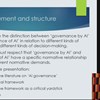formulated

Ethics of coordination
We need new ethics to understand our duties towards others in matters such as climate change.
The ambivalence of desistance: Balancing in the liminal space between deviance and conventionality
European Journal of Criminology Abstract Building and expanding on contemporary research where desistance is increasingly conceived of asa fragile and liminal experience, this paper examines the early dof ambivalence – an undertheorised concept in life course criminology. This paper employs qualitativeinterviews from a total of 10 participants who participated in SIG, a voluntary defector programmein Sweden. Despite having formulated a clear resolve to desist, the participantsnonetheless experienced feelings of ambivalence in relation to the desistance process. In theseinstances, the aspiring desisters were bordering between the prospects of a better, crime-freelife and the pains, losses, struggles and frustrations accompanying the early stages of desistance.It is argued that this liminal position, where the old life is to be discarded and a new, better lifeis yet to be built, may constitute a breeding ground for ambivalence – a state which needs tobe grounded in the precarious social position of marginalised youth which aspiring desisters typicallyoccupy.
The Repugnant Conclusion: An Overview
In Stephen M. Gardiner (red), The Oxford Handbook of Intergenerational Justice, Oxford Academic. Abstract The repugnant conclusion can be formulated as follows: For any population consisting of people wi
Completed: Sequences of Democratization
Why do some democratic transitions succeed and others do not? We attempt to identify which sequences lead to full and stable democracy and which sequences do not.
The end of capitalism? On how to create a vision of a sustainable future
This is an event organized in cooperation with Fri Tanke. Not too long ago, it was said that democracy had finally triumphed over totalitarian societal systems, and that long-term economic growth would
Eva Erman: Artificial Intelligence and the Political Legitimacy of Global Governance
Research seminar with Eva Erman. AbstractThe study of the social and ethical impact of AI is still in its infancy and contributions to the field have to keep up with the continuous developments of the important procedural aspects of good AI governance. One of the most important properties of good governance is political legitimacy. Starting out from the assumption that AI governance should be seen as global in scope, this paper has a twofold aim: a) to develop a theoretical framework for theorizing the political legitimacy of global AI governance and b) to demonstrate how it can be used as a critical yardstick for assessing the (lack of) legitimacy of actual instances of AI governance.

Eva Erman: Artificial Intelligence and the Political Legitimacy of Global Governance
The study of the social and ethical impact of AI is still in its infancy and contributions to the field have to keep up with the continuous developments of the booming AI industry. Though it is widely
On the Limits of the Precautionary Principle
Risk Analysis, Published online first, doi.org/10.1111/risa.13265 Abstract The precautionary principle (PP) is an influential principle of risk management. It has been widely introduced into environmental
Completed: Criminal networks and social organizing
How does criminal organization, for example in street gangs, arise? By understanding how the networks work, we can also suggest crime prevention strategies.
Future of food: A technology-centered path towards sustainable production in 2100
Futures, vol. 167 Abstract We stipulate a normatively desirable scenario for food production in 2100 and formulate a specific technology-centered path to reach it. In this scenario, the human population








